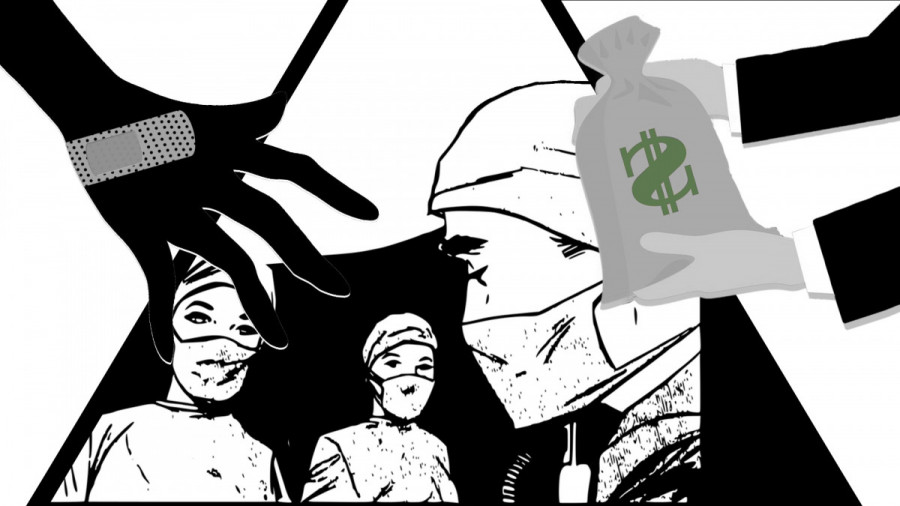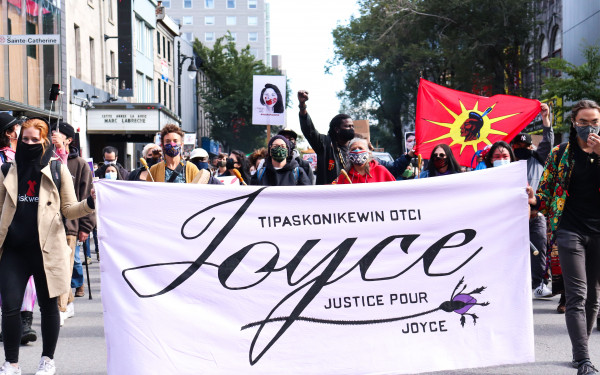From Negligence to Violence: For-Profit Healthcare and Medical Racism
Expanding Healthcare Privatization Could Increase Medical Racism, Experts Say
On Sept. 28, 2020, Joyce Echaquan, an Atikamekw mother, died at the Centre Hospitalier de Lanaudière in Saint-Charles-Borromée. The coroner’s report concluded that racism and prejudice were contributing factors to her death.
Following Echaquan’s death, the Quebec government implemented mandatory training on Indigenous peoples and the challenges they face, for all healthcare workers. However, it did not focus on the more pressing issue of systemic racism, residential schools or culturally unsafe care.
In early 2022, the Quebec government announced new healthcare reforms in hopes to revitalize its system, which would take effect in 2025.
The plan would include improvements like the end to mandatory overtime for nurses, more staff in health institutions, better access to family physicians, and even improved at-home care.
However, Quebec Premier François Legault has simultaneously supported a push towards privatized healthcare, publicized by Ontario Premier Doug Ford.
Research shows that a push towards privatization and the pursuit of profit in healthcare would result in the exacerbation of the systemic mistreatment of Black, Indigenous, and people of colour (BIPOC).
The public healthcare system is already at a breaking point. According to the Angus Reid Institute, 9 million Canadians have chronic difficulty in accessing healthcare due to shortages and the system’s deterioration.
But this has not deterred politicians like Ford and Legault from increasingly propping up the idea of expanding privatization in healthcare to help meet a growing demand.
In January, Ontario Premier Doug Ford announced his initiative to give a greater role to private, for-profit clinics. The alleged goal of the initiative is to seek to relieve the engorged public healthcare system and reduce wait times.
Should privatization take more space in Canada, Ford’s proposal promised that Canadians will not be paying out of pocket for their surgeries. In fact, the Canada Health Act (CHA) protects Canadians from any healthcare provider directly charging patients for insured health services.
On Feb. 6, CBC News: The National aired a discussion between healthcare workers, patients, and an economist. During the talk, economist Armine Yalnizyan confirmed that the profit private clinics will make would most likely be through patients paying for their rooms, analgesics, food, physiotherapy, and other services.
While surgeries will be free, the price of everything else related to them would increase. For instance, a patient who receives a colonoscopy in private care may not get the surgery done if unable to pay out-of-pocket for a dietician consult, said Danielle Martin, chair of the department of family and community medicine at the University of Toronto.
According to her, this upselling is already happening in private clinics.
Unequivocally, the costs of private healthcare will render BIPOC communities an afterthought. Exclusion from such care is medical racism, according to Ana Clarissa Rojas Durazo, co-editor of the book Color of Violence.
The benefits of privatization would likely be accessible only to people who have the means to pay for it. Concurrently, BIPOC demographics are less likely to reap the benefits of private care. “When we talk about patients not being charged,” Martin suggested, “that needs to be the case across the whole of the experience if we want this solution not to undermine equity.”
From privatization to medical racism
Systemic racism is caused by institutions that consciously or unconsciously create policies disadvantaging certain groups, causing a discrepancy in their access to services.
Because of systemic racism, BIPOC communities are more likely to have lower socioeconomic status, which is a major contributing factor in poorer health outcomes. For example, in 2016, 20.7 per cent of Black Canadians aged 25 to 59 lived in a low-income situation, compared to 12 per cent of their white counterparts.
According to Megan Sieroka, program coordinator at Dunin-Deshpande Queen’s Innovation Centre, medical professionals barely observe the existing inequities between BIPOC patients and white patients.
Sieroka explained that this results in a lower quality of care for those communities, and leads to a growing distrust of the healthcare system.
Medical racism is not only shown through the experiences of BIPOC patients, but BIPOC health workers and experts too. Many Black doctors like Dr. Notisha Massaquoi denounced the lack of race data collection in the Canadian healthcare system.
Race data could significantly improve the care of racialized patients, while the absence of it hides the reality of racial inequities.
With the increase of private, for-profit clinics, experts warn that the public healthcare system risks a significant understaffing and underfunding crisis.
Who suffers most from underfunded healthcare?
Linda Silas, president of the Canadian Federation of Nurses Union, told CTV News: “Understaffing has become an even bigger issue over the pandemic as many workers have been left burnt out and unable to provide patients with quality care when they become overworked.”
The consequences of understaffing and underfunding the public health system would result in a lack of resources, heightening medical racism.
Reports show understaffed healthcare systems may lead to more medical errors. It has been proven that medical errors on test diagnoses, for instance, were at 32 per cent for minority groups in comparison to 18 per cent for white people. Minority groups are more likely to experience harm and adverse consequences due to medical errors.
Meanwhile, an increased underfunding in the Canadian health care system is requiring nurses to take on more patients per day, seriously undermining their care, said Dr. Alika Lafontaine, president of the Canadian Medical Association. He also added that support for the public health system should be addressed before looking at other options, referencing the privatization proposal of Premiere Ford.
Reports also show that underresourced health environments may perpetuate racism because providers will resort to shortcuts, exacerbating the likelihood of racial bias in care.
Colleen Flood, a research chair in health law and policy and professor at the University of Ottawa, told the CBC: “Countries that have public-private systems, they spend a lot of time trying to figure out how to regulate the private sector so that it doesn’t absorb all the resources from the public health-care system.”
Serious shortages are more likely to affect public hospitals that primarily serve minorities in poorer areas. There are high chances that those hospitals have to lower their standards of care to palliate shortages, adversely affecting minority patients.
Because there is a lack of race data in Canada, it is hard to comprehend the inequities in health care, and caused by health policies. Expanding healthcare privatization could result in aggravating the existing understaffing and underfunding crisis in public hospitals.
Consequently, these crises could exacerbate medical racism, especially since they happen to be greater in poorer and minority communities. BIPOC communities are likely to have a lower socioeconomic status, experience discrimination, and medical errors in such circumstances.
To combat medical racism, the Canadian Medical Association Journal recommends training healthcare providers in anti-racism, anti-oppression and decolonization. The Truth and Reconciliation Commission of Canada calls for physicians to use Indigenous healing practices in the treatment of Indigenous patients.
This article originally appeared in Volume 43, Issue 13, published March 7, 2023.






_600_375_90_s_c1.jpg)
